How to look yourself up online
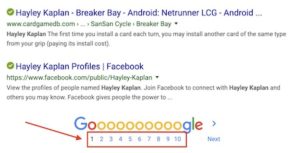
Search all pages in results
It’s important to look yourself up online occasionally so that you know what others who look you up will see and so that you can take action if you discover any problematic results. Remedies may include responding to a review, removal of content, informing others about the content or the inaccuracy of it or contacting a reputation management company to help you suppress awkward content that cannot be removed. Beyond the obvious method of entering your name into the search bar, I want to share some additional pointers. Although most people don’t search beyond the first few pages of results, when you look yourself up, please take the time to review the results on as many pages as you see.
How to look yourself up online:
- Search for different versions of your name. First search with your name between quotes to decrease the volume of results you need to review and to increase the accuracy of those results. Next, enter your name in the search field without quotes to see if you missed anything important in the first search.

Look yourself up on Google Images
- Include your full middle name and search without it too.
- Include your middle initial and search without it too.
- Search for common misspellings of your name.
- Search for both married and maiden names, if applicable.
- Search for your name with your current address(es) to see where this information is accessible via search engines. Enter your search terms without quotes and within quotes too.
- Search for all images of yourself to make sure there are no problematic photos of you online. (Type your name into Google and then click on the “images” tab to see only images.)
- Look yourself up on a handful of data broker sites. There are over 300 of these but start by reviewing the free results on the handful listed below. (Links will open in a new window so you can return to the tutorial link at any time.) Don’t purchase reports – it’s not necessary.
When reviewing your online search results, you are bound to be surprised by the volume of personal information that is so easily accessible. You’ll likely discover some inaccurate information mixed with the information that belongs to you and you may discover some of the inaccurate information belongs to someone with the same or a similar name to you. You may find evidence of something you did a long time ago, such as an embarrassing comment in a chatroom, an old speeding ticket you’d forgotten about or a DUI you’d prefer to forget. You may find detailed court records that you’d hoped would be private or a wonderful business review you did not know about that was posted a long time ago. Alternatively, you may be dismayed to discover an upsetting bad review. You may find personal or inflammatory information about yourself on websites or blogs or in new or old newspaper articles. You will find your address history, personal details such as your age, date of birth and family member names, court records, criminal history and more when you look yourself up on online directories and broker sites. While some information is removable and other information is not, the first order of business is to know how you look online so that you can take steps to preserve your reputation and to modify the way you look, if necessary.
When searching for yourself, please expect to find some personal data you’d prefer not be available and understand that you are not special because of this. This happens to everyone in the USA, including people who have never touched social media, a computer, iPad, smart phone or any other technology. The reason for this is because a lot of the online personal information originates in official public records, such as the trust deed for a property you own or from court records that are public by default. People who died long before the internet was created can be found online. Online information is being generated from more and more sources and in this day and age it’s expected that everyone have some type of online presence, and that’s not a bad thing!
At this point, you may be wondering what to do with problematic information you locate. Since each situation is unique and likely requires different strategies to handle, here are a few suggestions:
- If possible, contact the source of the post and ask them to remove it. (It could be a friend who posted something without your permission on social media or a business that is selling your data for profit.)
- Claim your business on review sites so that you can respond to negative reviews or contact the reviewer to resolve a bad situation.
- Hire a reputable Reputation Management Company but do research and look for reviews and feedback about that company before moving forward.
- Remove your own information with my free tutorials or hire me or another company to do this for you. Once again, look for reviews and feedback before moving forward because there are unscrupulous businesses that offer removal services but do not deliver.
This should get you started in the right direction. If you have questions, please ask them via a comment or if you require confidentiality, please reach out via the contact form on this site.
Until next time,… Stay Cyber Safe!

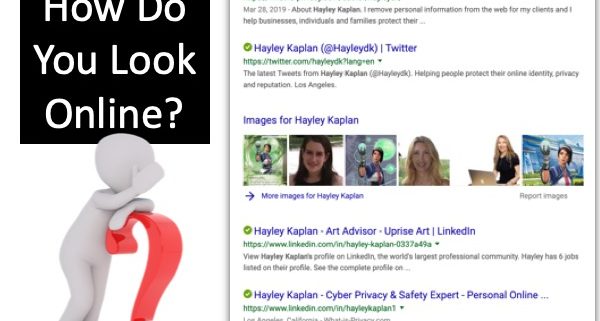
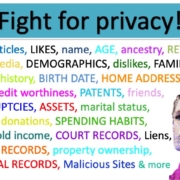


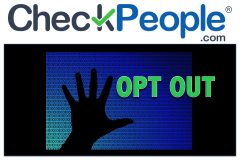
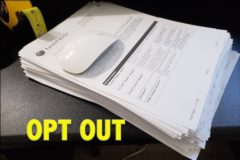
I agree, find yourself first (inaccurate/accurate info) before starting the task of removing any or ALL info of yourself on the web. I personally print a report on the person I am working on and then proceed to my master list of databases. If my info is “mixed” with someone else (ex. same name) – I try my best to contact them before removing the said incorrect info.
I have a master list of over 200 databases but Social Catfish, peekyou, peoplescheck are a few of my favorite to use in locating inaccurate info.
Pls tell me who i am
Why would I want to do that?